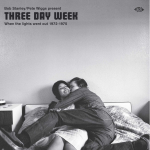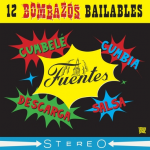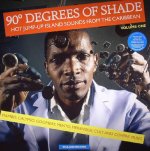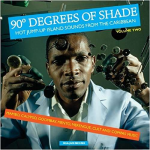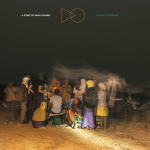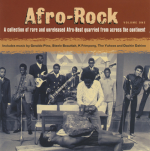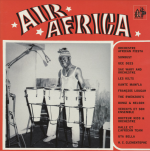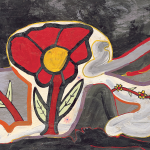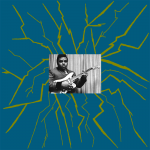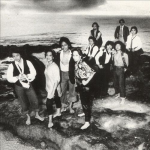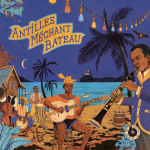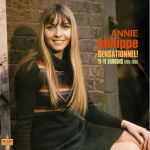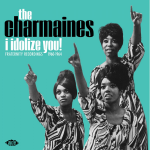V/A
Bob Stanley & Pete Wiggs Present Three Day Week - When The Lights Went Out 1972-1975
[engl] Britain wasn’t on its own in having a thoroughly miserable 1973: O Lucky Man! and Badlands both found a great year to premiere; Watergate brought America to a new low. But America didn’t still have back-to-backs and outside bogs. Tens of thousands of Britons were still housed in wartime pre-fabs. The bright new colours of the post-war Festival of Britain and Harold Wilson's talk in the 60s of the “white heat of technology” now seemed very distant as strikes, inflation, and food and oil shortages laid Britain low. What had gone wrong? And what did pop music have to say about it?
Many of the year’s biggest acts had set out on their particular journeys in the most idealistic years of the 60s (Yes, Genesis, the Moody Blues) and still held traces of that era’s promise. For acts such as Bowie and Roxy Music who had emerged in the new decade, one way out of the British malaise was to look into the future, embracing modernism and the space age beyond, a world of electric boots and mohair suits. Another was to draw heavily on the revered 50s, retreating to rock’s unsullied roots while remaining ostensibly current – Wizzard, Mott The Hoople and even the Rubettes managed to reshape the 50s to their own ends, much as Springsteen did in the States, although beyond them lay Showaddywaddy, Shakin’ Stevens, and a sickly nosedive into nostalgic yearning.
This left a small rump of acts diligently soundtracking Britain’s present, not with a wagging finger but a fuzzy guitar, a primitive synthesiser, and a pitch-black sense of humour. Quite often these records were cut in home studios – many featured the same basic synth (just the one) that Roxy’s Eno and Hawkwind’s DikMik used; the guitarists still played blues progressions picked up from the Stones; and they sometimes touched on glam – the era’s brightest, newest noise – found inspiration in its disposability and its energy, but didn’t have the luxury of a Chinn and Chapman or a Mickie Most to sprinkle fairy dust on their final mix. And outside the studio door were the strikes, the cuts, economic chaos, teenage wasteland – these musicians created music that, intentionally or not, echoed their surroundings. It wasn’t glam, but it emerged from what Robin Carmody has called “the glamour of defeat, the glory of obliteration”.
The songs on “Three Day Week” amplified the noise of a country still unable to forget the war, even as it watched the progressive post-war consensus disintegrating. We hear shrugs and cynicism, laughter through gritted teeth. Comparing it to the richness of records made just five or six years earlier, you might think musical instruments had been rationed, and that everyone has one eye on the clock, cutting corners to get the recording finished before the next power cut. You picture engineers in donkey jackets, with a brazier by the mixing desk. You hear odd electronic explosions, quacks and squiggles. The pub piano is predominant, with its brown ale, Blitz-spirit, grin-and-bear-it jollity. And under many of these tracks is a barely concealed frustration (sexualised on the Troggs’ ‘I’m On Fire’) and even anger (how else to read ‘Urban Guerrilla’, or the howling and the hand grenade at the end of Stud Leather’s ‘Cut Loose’?). Think of “Three Day Week” as an extended, musical Play For Today.
The Three Day Week itself – which only lasted eight weeks, but was the nadir of a four-year-long depression – had been a result of the Tory government’s limit on pay rises in October 1973 and the miners strike that followed. Back at the start of 1972 the miners had struck for higher pay and won, averting Prime Minister Edward Heath’s threat to introduce a three day week in manufacturing and industry to hold on to energy reserves. By late 1973, though, the miners had slipped from top of the industrial wages league to 18th. Amid strikes by civil servants, medical staff, railway and dock workers, the miners went on strike again. The Three Day Week proper lasted from New Year’s Day to 7 March 1974. TV shut down at 10:30. Power cuts and blackouts in homes across Britain meant the sales of candles and torches soared. Old soldiers tutted. The Army were on standby. And, nine months later, there was a spike in the birth rate.
For the younger generation, however, the Three Day Week is not remembered as a period of woe. Power cuts were fun! Who wouldn’t like the idea of a three day week? More time to play! It was also easy for kids to confuse pop culture and politics when the Prime Minister was Ted Heath and the leader of Britain’s biggest union, the TGWU, was Jack Jones. Even the TUC’s leader Vic Feather sounded like the bassist from a RAK act. There is also the folk memory of the period being a high-water mark for the power of trade unions, who seemingly always struck for higher pay and won, a dreamtime for many on the left. The second miners strike brought down the Tory government – what a time to be alive! Margaret Thatcher was only education secretary at this point, the hated “milk snatcher”, and no one had a crystal ball to see what the Tory reaction might be several years down the line.
The records on this collection were almost all released as 45s, sent to shops in cost-cutting plain white paper bags, and – thanks to the oil shortage caused by the Arab-Israeli conflict – pressed on thinner vinyl than you’d have had ten years earlier. On every level, they felt as if they were being recorded and released under wartime restrictions. Many of these tracks were B-sides, recorded in haste, with no commercial forethought or relevance to the A-side, because, as Peter Shelley recalls, “You’d made the wild assumption that no one would ever play it”.
Why did the music end up sounding this way? There had been a general sense of decline in Britain since the turn of the decade – not only in industry but in film, art, fashion, and in people’s expectations. You could trace its roots further back to 1968, when the collapse of the Ronan Point tower block in East London sounded a death knell for modernist dreams. Or to 1967, a year for which Swinging London has prevailed in popular memory over Cathy Come Home, but which should be remembered for the devaluation of the pound and the capital's nationalistic dock strikes as much as Alexandra Palace’s 14 Hour Technicolour Dream. By 1972, everything new – be it a brick wall or a terylene suit – was a shade of brown or orange, and the smell of sweat and odour-hugging man-made fabrics (not only clothes but carpets and curtains) was dominant. The worsted mills of Bradford and cotton mills of Manchester were fast disappearing, and the mix of wet wool, chimney smoke and boiled cabbage that Shena Mackay recalled being London’s olfactory default in the 60s had been replaced by weeks-old fag smoke, BO, and something plasticky you couldn’t put your finger on.
Few of the songs on “Three Day Week” are politically direct: the Edgar Broughton Band had been Ladbroke Grove rabble rousers at the tail end of the 60s, but their ambitions sound entirely blunted on the monochrome hopelessness of ‘Homes Fit For Heroes’; Phil Cordell’s ‘Londonderry’ is diffuse, but it was an odd place to single out for a song title in 1973; Pheon Bear appears to be losing the will to live even as he shouts himself hoarse on ‘War Against War’. The ambivalence of the Strawbs on ‘Part Of The Union’ – a #2 hit – is entirely in keeping with the pub humour and shrugging cynicism of the era. So there is a little agitation here, but there is plenty of gleeful irreverence. One more drink? What have we got to lose? The government’s on its knees and we might all be out of work tomorrow. Quick, somebody, get on the piano before the lights go out again.
BOB STANLEY

